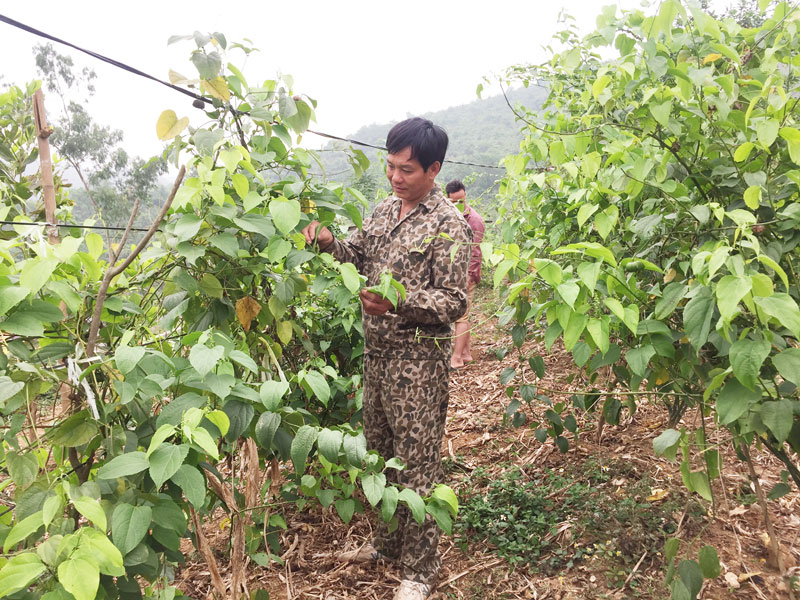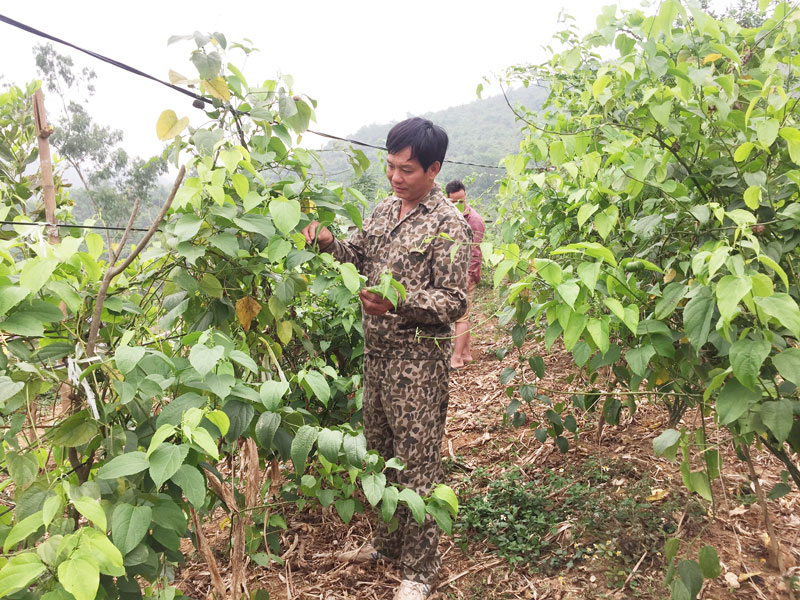
(HBO) - As a typical farmer doing good business in the locality, Mr. Ly Van Diem in Ngoc Ha village, Hop Thanh commune (Ky Son) owns a comprehensive economic model for earning hundreds of millions of dongs a year. As a person interested in researching, he actively explored and decided to grow sachi trees to develop family economics.

The model of planting sachi of Mr. Ly Van Diem’s family in
Ngoc Ha village, Hop Thanh commune (Ky Son) initially brought high economic
efficiency.
Taking us to the garden, pointing at the green
sachi trees, Mr. Diem shared: Through researching via the internet, books,
newspapers and visiting models inside and outside the province, recognizing
that sachi trees would bring a high economic value while only investing to
plant once but for many years. If science and technology are applied properly
in planting and caring, the tree will certainly grow well, without pestilent
problems, the economic efficiency will surely be high. After being trained in
techniques of planting, caring and pest controlling, in April, 2017, he bravely
participated in the model of planting sachi plants invested and sponsored by
Inca Vietnam joint Stock Company. He started to improve and convert 1 hectare
of inefficient garden land and sugarcane planting land into planting 2,000
sachi trees.
Sachi is a multi-use plant that can be utilized
most parts of the plant for processing food, cosmetics and even
pharmaceuticals. Being the first person in the local to riskily choose new
varieties for economic development, he is sometimes worried about the
efficiency and quality of the plant. However, the trees quite fits with the
land and the climate in the mountain, the sachi garden gradually grows, every
tree grows to develop branches, shoots, strong leaves. After more than half a
year, the leaves were able to be harvested and fortune-fruit began. Post -
harvested products are consumed by the company. Up to now, Mr. Diem’s family
has collected the leaves for three times to give the company for sale at 10,000
VND / kg fresh leaves and 40,000 VND / kg dry leaves. Because of new planted
trees, the fruit was only fortune collected, so far, so he collected 20 kg of
fruit in the first harvest, with the price of 30,000 VND / kg dry fruit and
50,000 VND / kg seeds. "Sachi is a year-round harvesting crop with a
year-on-year increase in crop yields and a stable price for the company. Only
in the first year, my family could earn more than ten million dongs. With this
trend, we can get back our investment soon and have our profits in some years
only”- Mr. Diem confirmed.
According to data from the Hoa Binh Provincial Party Committee, the industrial production index for the first six months of 2025 is estimated to have increased by 20% compared to the same period last year. This marks the highest year-on-year growth rate for this period since 2020.
In the first six months of 2025, Hoa Binh province’s export turnover was estimated at 1.145 billion USD, marking an 18.11% increase compared to the same period in 2024. Import turnover was estimated at $ 804 million, a 17.15% increase, which helped the province maintain a positive trade balance.
The lives of the ethnic minority farmers in Tan Lac district have gradually improved thanks to the new directions in agricultural production. This is a testament to the collective strength fostered through the professional associations and groups implemented by various levels of the district’s Farmers’ Union.
With the motto the "product quality comes first,” after nearly one year of establishment and operation, Muong village’s Clean Food Agricultural and Commercial Cooperative, located in Cau Hamlet, Hung Son Commune (Kim Boi district), has launched reputable, high-quality agricultural products to the market that are well-received by consumers. The products such as Muong village’s pork sausage, salt-cured chicken, and salt-cured pork hocks have gradually carved out a place in the market and they are on the path to obtaining the OCOP certification.
In the past, the phrase "bumper harvest, rock-bottom prices" was a familiar refrain for Vietnamese farmers engaged in fragmented, small-scale agriculture. But today, a new spirit is emerging across rural areas of Hoa Binh province - one of collaboration, organisation, and collective economic models that provide a stable foundation for production.
Maintaining growing area codes and packing facility codes in accordance with regulations is a mandatory requirement for agricultural products to be eligible for export. Recently, the Department of Agriculture and Environment of Hoa Binh province has intensified technical supervision of designated farming areas and packing facilities to safeguard the "green passport" that enables its products to access international markets.



